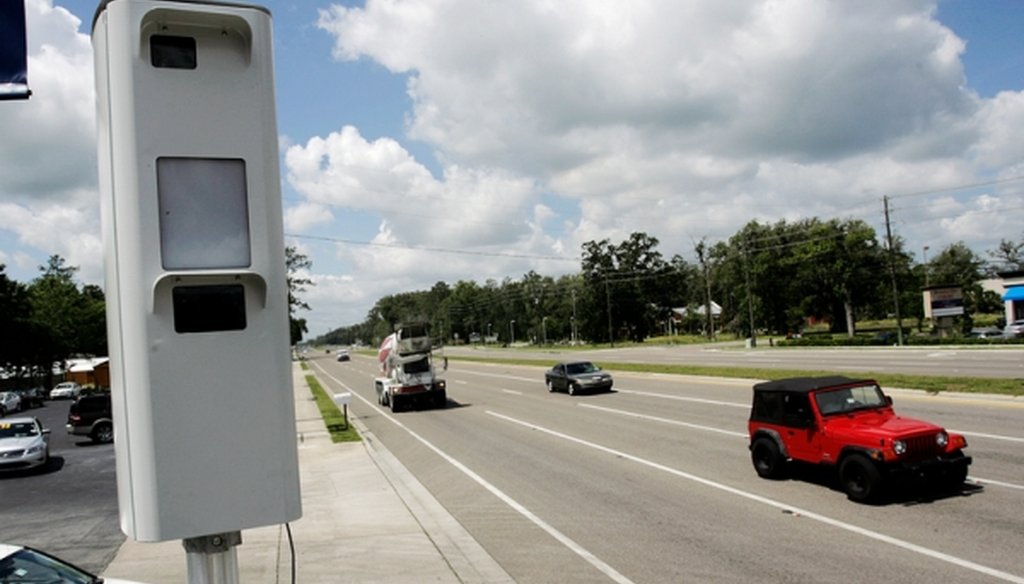Stand up for the facts!
Our only agenda is to publish the truth so you can be an informed participant in democracy.
We need your help.
I would like to contribute

A red-light traffic camera on U.S. 41 in Brooksville, Fla., on May 17, 2012. (Octavio Jones/Tampa Bay Times)
Serious news about U.S. Sen. Marco Rubio’s 2016 presidential campaign nearly screeched to a halt amid a New York Times blog post about his four traffic violations over 18 years.
The June 5 report noted that Rubio’s wife Jeanette had 13 tickets. His violations included careless driving, speeding, running a stop sign (which was later dismissed) and running a red light, caught by a traffic camera.
On Twitter, readers lampooned the New York Times with the #RubioCrimeSpree hashtag. "Marco once picked all the marshmallows out of the Lucky Charms box," said one post, while others riffed, "BREAKING: Marco Rubio once ripped a tag from a mattress" and "Opens his eyes when he plays Marco Polo."
The next day in Iowa, Rubio told MSNBC: "Let me just say, I really don’t like red-light cameras. That’s a big scam. But that’s another topic for another day."
Why not today?
We’ve actually had cause to fact-check claims about red-light cameras. Whether or not they’re a "scam" -- defined by Merriam-Webster's online dictionary as "a dishonest way to make money by deceiving people" -- is a matter of opinion. But we do think the evidence about their effectiveness is worth a review.
Rubio received a violation for running a red-light in his home city of West Miami in November 2011. Miami-Dade court records show the state sent Rubio a letter warning him that his license would be suspended if the matter wasn’t addressed. Rubio’s attorney paid the fee, his license was not suspended, and the case dismissed in March 2012.
Litigation related to red-light cameras
About 21 states have red-light cameras. In Florida, the cameras are in dozens of cities, including West Miami, and they result in more than $100 million in fines, which are shared by the cities and the state.
But lawsuits have led some cities to suspend or shut down the cameras or restructure their programs.
In June 2014, the Florida Supreme Court ruled that several cities illegally created red-light camera programs between 2008 and 2010. Before 2010, the violations were city "code violations" and motorists had to go to hearings at city hall, which motorists complained were biased.
"These were kangaroo courts trumped up for the purposes of extorting money from drivers, " said Hallandale Beach lawyer Bret Lusskin, who represented the motorist in a case in the city of Aventura, told the Miami Herald after the state Supreme Court ruling.
In a separate lawsuit, a Florida appellate court ruled in 2014 that the city of Hollywood illegally allowed a camera vendor, rather than police officers, to issue the violations to red-light runners. The Florida Supreme Court declined to review that decision in April.
"The general principle of cameras are legal as long as they are used in a way that conforms with state statute and the Constitution," said State Rep. David Kerner, D-Palm Springs, one of the lawyers who represented motorists. "The program itself isn’t illegal."
Kerner said he wouldn’t use the word "scam" to describe the cameras. But cities view them as money generators, he said.
"There is probably some legitimate public safety value to the cameras, but in my five years of suing cities, counties and the state for improper use of the cameras, it is pretty clear to me from a personal level they are really only concerned by the revenue side of it," Kerner said.
Some cities continue to defend the red-light cameras.
"It strikes me that what the senator – and many others who have espoused a similar view – are actually complaining about is that technology has made it easier for law enforcement to catch those who refuse to abide by laws intended to protect the safety of others," said Edward G. Guedes, a lawyer for the Weiss Serota law firm who has represented dozens of Florida cities statewide.
Research is conflicted
There’s not much consensus about whether the cameras improve public safety.
The University of South Florida’s Center for Urban Transportation Research told us that the most recent studies hadn’t changed what prior research has said -- that cameras seem to reduce more severe right-angle and left-turn crashes, but increase rear-end crashes. Violations may be down, but the cameras’ effect on overall safety is still debatable.
Barbara Langland Orban, associate professor of health administration at USF, said part of the problem is that someone running a red light intentionally is usually doing so because they think they can cross against traffic without an accident, perhaps because of the light delay for cross traffic. Cameras don’t prevent people from running a red light accidentally, which is what often causes crashes.
"Red-light running fatalities did not decrease in Florida after cameras became legal in 2010," she said. "About 50 red-light running fatalities continue to occur each year."
The Florida Department of Highway Safety and Motor Vehicles found in a survey of 75 agencies that between 2012-13 about 5 percent of the 1 million violation notices were issued to repeat offenders.
"Since it is unquestionably an objective of these red-light camera programs to modify unlawful behavior patterns by drivers, I would be prepared to argue that the programs have already achieved that objective," Guedes said.
Rubio certainly has grounds here to criticize the cameras. Lawsuits have forced many cities to suspend or shut down their programs and refund fines and make changes to their programs. Also, the research about the effectiveness of the cameras in terms of public safety is mixed.
Though Rubio says they are a "scam" -- an opinion we aren’t rating on our Truth-O-Meter -- he omitted that they are allowed in the state. This time, we’ll let his claim go with a warning.
Our Sources
Governors Highway Safety Association, "Speed and red light cameras," June 2015
Miami-Dade Court Records, Online services, Accessed June 8, 2015
New York Times, "Rubios on the road have drawn unwanted attention," June 5, 2015
MSNBC, "Marco Rubio: 4 tickets ‘not that many,’ red light cameras a ‘scam,’" June 6, 2015
Miami Herald, "Meet Marco Rubio, Miami driver," June 5, 2015
Sarasota Herald-Tribune, "Panel kills limits on red-light cameras," April 15, 2015
Florida Department of Highway Safety and Motor Vehicles, "Red light camera summary report," Jan. 8, 2014
Urban Transit Institute, "A Detailed Investigation of Crash Risk Reduction resulting From Red Light Cameras in Small Urban Areas," July 2004
Journal of Trauma, "Red Light Cameras: Do They Change Driver Behavior and Reduce Accidents?," March 2010
Insurance Institute for Highway Safety, "Camera enforcement in 14 large cities reduces rate of fatal red light running crashes by 24 percent," Feb. 1, 2011
Texas A&M Transportation Institute, "TTI study underscores safety benefits of red light cameras," Aug. 1, 2011
Chicago Tribune, "Many red light cameras put in low-crash areas, Tribune study finds," Dec. 22, 2014
Miami Herald, "Aventura, other city red-light camera programs circumvented state law, Florida high court rules," June 12, 2014
Evaluation & the Health Professions, "Light Camera Studies Explaining Differences in Crash and Injury Crash Outcomes in Red," July 9, 2014
Health Behavior & Policy Review, "Red Light Cameras Unsuccessful in Reducing Fatal Crashes in Large US Cities," 2014
Sun-Sentinel, "Tamarac turns off red light cameras," June 7, 2015
PolitiFact Florida, "Rick Kriseman says red light cameras change driver behavior, reduce most dangerous crashes," Aug. 1, 2013
Interview, Alex Conant, U.S. Sen. Marco Rubio campaign spokesman, June 8, 2015
Interview, State Rep. David Kerner-D Palm Springs, lawyer who represents motorists in red light camera cases, June 8, 2015
Interview, Michael Hernandez, Miami-Dade County spokesman, June 8, 2015
Interview, Barbara Langland-Orban, University of South Florida professor of health administration, June 8, 2015
Interview, Ed Guedes, Weiss Serota attorney, June 8, 2015
Interview, West Miami police chief Nelson Andreu. June 8, 2015
Interview, Jose Villalobos, West Miami city attorney, June 8, 2015
Interview, John Lucas, Florida Department of Highway Safety and Motor Vehicles spokesman, June 9, 2015
Interview, Pei-Sung Lin, USF Center for Urban Transportation Research program director, June 9, 2015

































